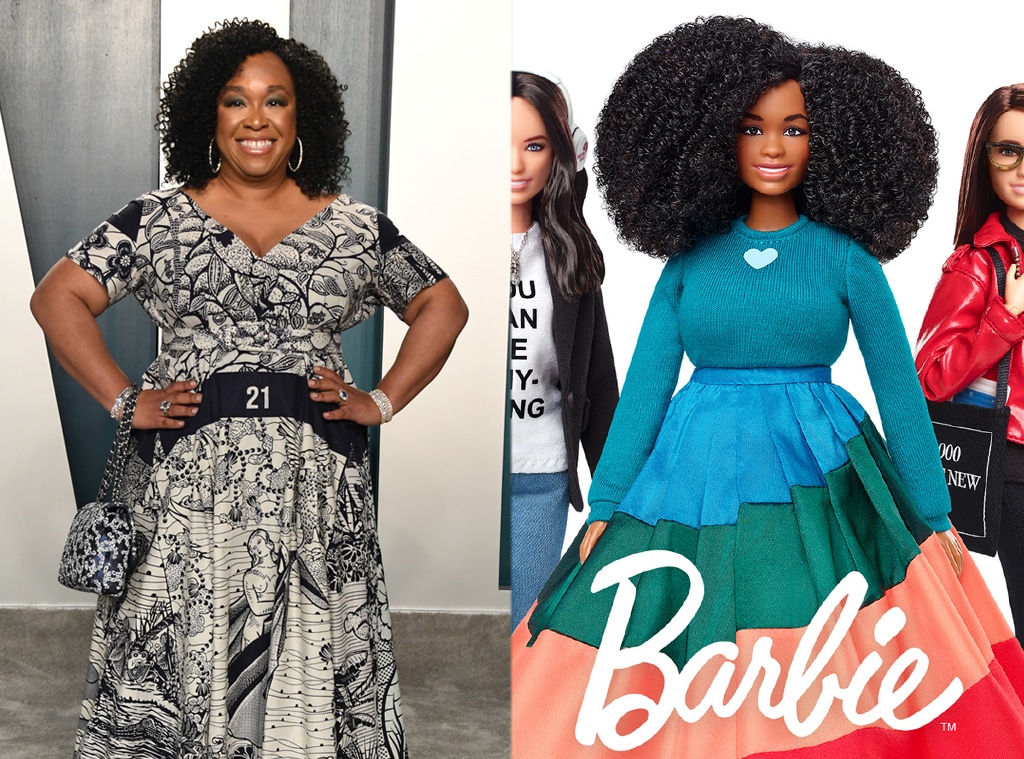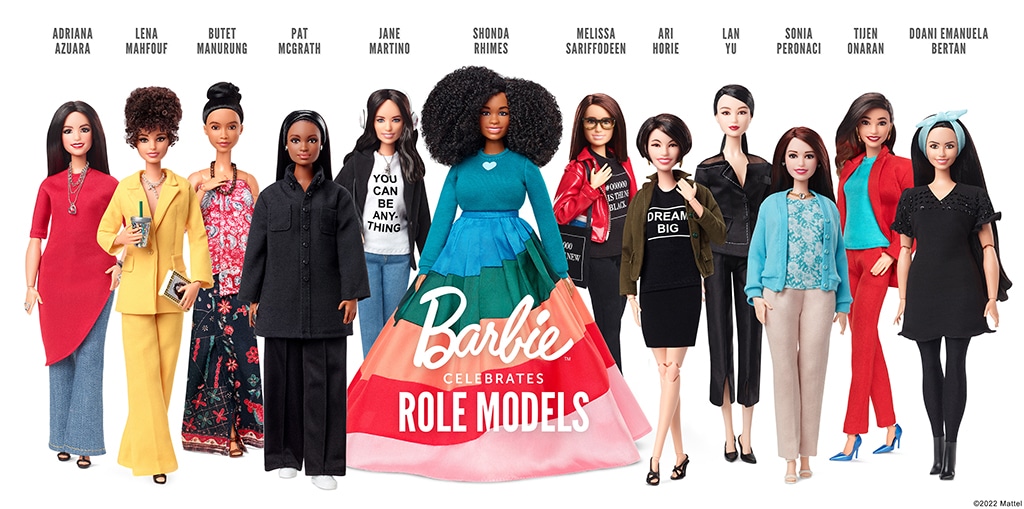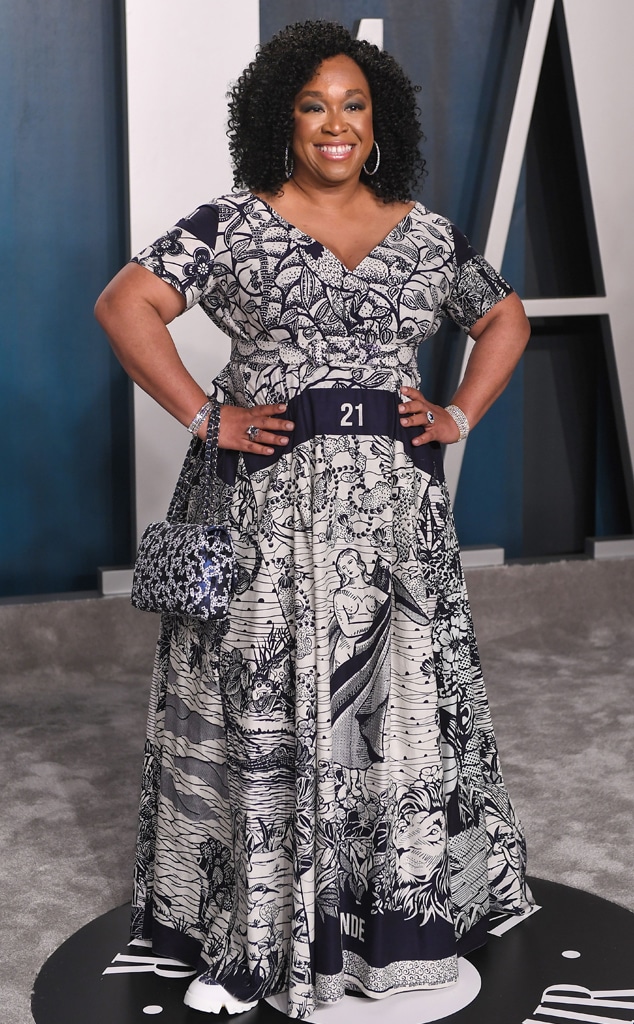In honor of International Women’s Day, TV titan Shonda Rhimes is coming through with the ultimate advice: “Feel very comfortable in where you’re going to say no and where you’re going to say yes.”
She’s a Barbie, girl, but it’s still Shonda Rhimes‘ world.
The TV titan was selected by Barbie, along with 11 other female role models and entrepreneurs who are breaking barriers in their respective careers, to be honored in celebration of International Women’s Day and inspire the next generation of kick ass creators. And the prolific producer—who has gifted the world with Grey’s Anatomy, Scandal, How to Get Away With Murder, Bridgerton and Inventing Anna, NBD!—received her own one-of-a-kind Barbie dolls in her likeness.
“The idea that there are dolls out there that can look like you and feel like you and give you the ability to imagine yourself in a different world, in a different way, in a way that maybe you only secretly dreamed, or thought was impossible in real life, I think that is incredibly important,” the Shondaland founder said in a statement. “As a storyteller, I think everything begins with your imagination. The way that you begin to imagine yourself really does start the story of who you are as a person.”
Telling stories is something Rhimes knows how to do, with her latest hit series, Inventing Anna and Bridgerton, proving why she is one of Netflix’s highest paid creatives after partnering with the streaming giant in 2017.
In honor of International Women’s Day (March 8), the 52-year-old showrunner shared her inspiring career wisdom that we suggest writing on a Post-It note and sticking to your desk or, you know, embroidering on a pillow.
“My best advice for future generations of women coming up in the television industry is really to stand your ground,” Rhimes shared with E! News, “and to not be interested in other people’s opinions of who you are should be.”
 Jon Kopaloff/WireImage, Mattel, Inc.
Jon Kopaloff/WireImage, Mattel, Inc.She knows firsthand that, “a lot of people will tell you ‘no’ and a lot of people will tell you that’s not the way that things are done or that’s not the way things have been done,” she continued, “Well, how things have been done hasn’t necessarily been the greatest way to do things. So come up with your own way to do things and move forward from there.”
Forging her own path is something Rhimes is more than familiar with since her first TV show Grey’s Anatomy began airing on ABC in 2005 as a mid-season replacement for Boston Legal. As its star Ellen Pompeo once told The Hollywood Reporter, she thought the show was “dead in the water.”
Fast-forward 17 years and Grey’s is still thriving, 390 episodes and several spinoffs and billions of dollars in revenue later. And it’s largely thanks to the power of Rhimes’ culture-defining storytelling—you can thank her for every reality TV contestant talking about finding their “person,” the rise of the term “va-jay-jay” and red wine and popcorn becoming a suitable dinner á la Scandal‘s Olivia Pope—and her commitment to color blind casting and empowering, yet flawed, female characters.
“I wanted to create a world in which you felt as if you were watching very real women,” Rhimes explained to Oprah Winfrey in 2006. “Most of the women I saw on TV didn’t seem like people I actually knew. They felt like ideas of what women are. They never got to be nasty or competitive or hungry or angry. They were often just the loving wife or the nice friend. But who gets to be the bitch? Who gets to be the three-dimensional woman?”
 Mattel, Inc.
Mattel, Inc.And for several years, she literally owned a night of programming on ABC, with her “TGIT” (Thank God It’s Thursday) line-up of Grey’s, Scandal and How to Get Away With Murder dominating social media and attracting millions of viewers, becoming one of the last bastions of the must-see network TV era.
Which is why fans were shocked when Rhimes announced in 2017 that her Shondaland production company was moving to Netflix. Three years later, Rhimes opened up about the Disneyland debacle that led her to part ways with ABC after 15 years.
As she explained to The Hollywood Reporter, Rhimes had been given an all-inclusive pass to the California theme park and she had negotiated for a second pass to give to her nanny. On the day the family had planned to attend, she realized her sister would need one as well and asked if she could transfer her pass to her sibling.
According to the Year of Yes author, getting the pass proved to be a headache. “We never do this,” Shonda claimed she was told more than once when asking for another pass. Ultimately, Rhimes called a “high-ranking executive” to see if they could help settle things, but the unnamed exec reportedly asked her, “Don’t you have enough?” She called her lawyer that day to begin her exodus.
Rhimes knew her value and worth, so she chose the unknown over settling, something she hopes young women can use in their own lives.
“Feel very comfortable in where you’re going to say no and where you are going to say yes,” Rhimes told E! News. “But also where you’re going to break ground and do something new.” (Like land a historic deal at Netflix for instance.)
 Anthony Harvey/Shutterstock
Anthony Harvey/ShutterstockThat ferocious and inspiring belief in herself and her abilities is something that had been instilled in Rhimes from a young age, growing up as the youngest of six in Chicago.
“The woman in my life who has had the biggest impact on me has been my mother,” Rhimes explained. “I have a very strong, smart, impactful, commanding mother who really believed in us, along with my father. My parents are really people who felt like we could do anything.”
And it seems like Rhimes’ penchant for a passionate monologue from a parent in any of her shows comes from the support she and her siblings received from college professor Vera and university administrator Ilee Rhimes, Jr.
“They had six kids, four of whom were girls and it never occurred to them once that as girls we weren’t going to be as successful, as strong, as smart as the boys in our family or out there in the world,” Rhimes reflected. “My father and my mother both believed that we absolutely had the right to be anywhere we wanted to be and own any room that we were in. And they were very, very, very supportive of us.”




